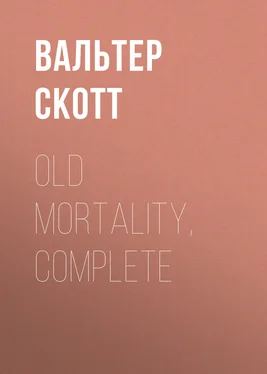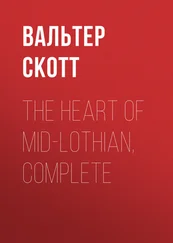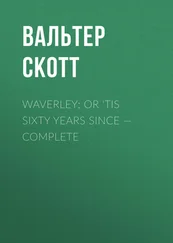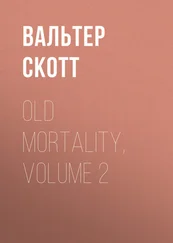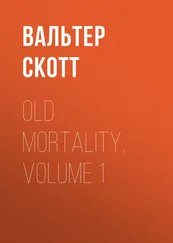Вальтер Скотт - Old Mortality, Complete
Здесь есть возможность читать онлайн «Вальтер Скотт - Old Mortality, Complete» — ознакомительный отрывок электронной книги совершенно бесплатно, а после прочтения отрывка купить полную версию. В некоторых случаях можно слушать аудио, скачать через торрент в формате fb2 и присутствует краткое содержание. Жанр: foreign_prose, foreign_antique, на английском языке. Описание произведения, (предисловие) а так же отзывы посетителей доступны на портале библиотеки ЛибКат.
- Название:Old Mortality, Complete
- Автор:
- Жанр:
- Год:неизвестен
- ISBN:нет данных
- Рейтинг книги:4 / 5. Голосов: 1
-
Избранное:Добавить в избранное
- Отзывы:
-
Ваша оценка:
- 80
- 1
- 2
- 3
- 4
- 5
Old Mortality, Complete: краткое содержание, описание и аннотация
Предлагаем к чтению аннотацию, описание, краткое содержание или предисловие (зависит от того, что написал сам автор книги «Old Mortality, Complete»). Если вы не нашли необходимую информацию о книге — напишите в комментариях, мы постараемся отыскать её.
Old Mortality, Complete — читать онлайн ознакомительный отрывок
Ниже представлен текст книги, разбитый по страницам. Система сохранения места последней прочитанной страницы, позволяет с удобством читать онлайн бесплатно книгу «Old Mortality, Complete», без необходимости каждый раз заново искать на чём Вы остановились. Поставьте закладку, и сможете в любой момент перейти на страницу, на которой закончили чтение.
Интервал:
Закладка:
“Stay, stay,” said Cornet Grahame, “let me look at the paper.—Hackston of Rathillet, tall, thin, black-haired.”
“That is not my man,” said Bothwell.
“John Balfour, called Burley, aquiline nose, red-haired, five feet eight inches in height”—“It is he—it is the very man!” said Bothwell,—“skellies fearfully with one eye?”
“Right,” continued Grahame, “rode a strong black horse, taken from the primate at the time of the murder.”
“The very man,” exclaimed Bothwell, “and the very horse! he was in this room not a quarter of an hour since.”
A few hasty enquiries tended still more to confirm the opinion, that the reserved and stern stranger was Balfour of Burley, the actual commander of the band of assassins, who, in the fury of misguided zeal, had murdered the primate, whom they accidentally met, as they were searching for another person against whom they bore enmity. [Note: One Carmichael, sheriff-depute in Fife, who had been active in enforcing the penal measures against non-conformists. He was on the moors hunting, but receiving accidental information that a party was out in quest of him, he returned home, and escaped the fate designed for him, which befell his patron the Archbishop.] In their excited imagination the casual rencounter had the appearance of a providential interference, and they put to death the archbishop, with circumstances of great and cold-blooded cruelty, under the belief, that the Lord, as they expressed it, had delivered him into their hands.
[Note: Murderers of Archbishop Sharpe. The leader of this party was David Hackston, of Rathillet, a gentleman of ancient birth and good estate. He had been profligate in his younger days, but having been led from curiosity to attend the conventicles of the nonconforming clergy, he adopted their principles in the fullest extent. It appears, that Hackston had some personal quarrel with Archbishop Sharpe, which induced him to decline the command of the party when the slaughter was determined upon, fearing his acceptance might be ascribed to motives of personal enmity. He felt himself free in conscience, however, to be present; and when the archbishop, dragged from his carriage, crawled towards him on his knees for protection, he replied coldly, “Sir, I will never lay a finger on you.” It is remarkable that Hackston, as well as a shepherd who was also present, but passive, on the occasion, were the only two of the party of assassins who suffered death by the hands of the executioner.
On Hackston refusing the command, it was by universal suffrage conferred on John Balfour of Kinloch, called Burley, who was Hackston’s brother-in-law. He is described “as a little man, squint-eyed, and of a very fierce aspect.”—“He was,” adds the same author, “by some reckoned none of the most religious; yet he was always reckoned zealous and honest-hearted, courageous in every enterprise, and a brave soldier, seldom any escaping that came into his hands. He was the principal actor in killing that arch-traitor to the Lord and his church, James Sharpe.” See Scottish Worthies. 8vo. Leith, 1816. Page 522.]
“Horse, horse, and pursue, my lads!” exclaimed Cornet Grahame; “the murdering dog’s head is worth its weight in gold.”
CHAPTER V
Arouse thee, youth!—it is no human call—
God’s church is leaguer’d—haste to man the wall;
Haste where the Redcross banners wave on high,
Signal of honour’d death, or victory!
Morton and his companion had attained some distance from the town before either of them addressed the other. There was something, as we have observed, repulsive in the manner of the stranger, which prevented Morton from opening the conversation, and he himself seemed to have no desire to talk, until, on a sudden, he abruptly demanded, “What has your father’s son to do with such profane mummeries as I find you this day engaged in?”
“I do my duty as a subject, and pursue my harmless recreations according to my own pleasure,” replied Morton, somewhat offended.
“Is it your duty, think you, or that of any Christian young man, to bear arms in their cause who have poured out the blood of God’s saints in the wilderness as if it had been water? or is it a lawful recreation to waste time in shooting at a bunch of feathers, and close your evening with winebibbing in public-houses and market-towns, when He that is mighty is come into the land with his fan in his hand, to purge the wheat from the chaff?”
“I suppose from your style of conversation,” said Morton, “that you are one of those who have thought proper to stand out against the government. I must remind you that you are unnecessarily using dangerous language in the presence of a mere stranger, and that the times do not render it safe for me to listen to it.”
“Thou canst not help it, Henry Morton,” said his companion; “thy Master has his uses for thee, and when he calls, thou must obey. Well wot I thou hast not heard the call of a true preacher, or thou hadst ere now been what thou wilt assuredly one day become.”
“We are of the presbyterian persuasion, like yourself,” said Morton; for his uncle’s family attended the ministry of one of those numerous presbyterian clergymen, who, complying with certain regulations, were licensed to preach without interruption from the government. This indulgence, as it was called, made a great schism among the presbyterians, and those who accepted of it were severely censured by the more rigid sectaries, who refused the proffered terms. The stranger, therefore, answered with great disdain to Morton’s profession of faith.
“That is but an equivocation—a poor equivocation. Ye listen on the Sabbath to a cold, worldly, time-serving discourse, from one who forgets his high commission so much as to hold his apostleship by the favour of the courtiers and the false prelates, and ye call that hearing the word! Of all the baits with which the devil has fished for souls in these days of blood and darkness, that Black Indulgence has been the most destructive. An awful dispensation it has been, a smiting of the shepherd and a scattering of the sheep upon the mountains—an uplifting of one Christian banner against another, and a fighting of the wars of darkness with the swords of the children of light!”
“My uncle,” said Morton, “is of opinion, that we enjoy a reasonable freedom of conscience under the indulged clergymen, and I must necessarily be guided by his sentiments respecting the choice of a place of worship for his family.”
“Your uncle,” said the horseman, “is one of those to whom the least lamb in his own folds at Milnwood is dearer than the whole Christian flock. He is one that could willingly bend down to the golden-calf of Bethel, and would have fished for the dust thereof when it was ground to powder and cast upon the waters. Thy father was a man of another stamp.”
“My father,” replied Morton, “was indeed a brave and gallant man. And you may have heard, sir, that he fought for that royal family in whose name I was this day carrying arms.”
“Ay; and had he lived to see these days, he would have cursed the hour he ever drew sword in their cause. But more of this hereafter—I promise thee full surely that thy hour will come, and then the words thou hast now heard will stick in thy bosom like barbed arrows. My road lies there.”
He pointed towards a pass leading up into a wild extent of dreary and desolate hills; but as he was about to turn his horse’s head into the rugged path, which led from the high-road in that direction, an old woman wrapped in a red cloak, who was sitting by the cross-way, arose, and approaching him, said, in a mysterious tone of voice, “If ye be of our ain folk, gangna up the pass the night for your lives. There is a lion in the path, that is there. The curate of Brotherstane and ten soldiers hae beset the pass, to hae the lives of ony of our puir wanderers that venture that gate to join wi’ Hamilton and Dingwall.”
Читать дальшеИнтервал:
Закладка:
Похожие книги на «Old Mortality, Complete»
Представляем Вашему вниманию похожие книги на «Old Mortality, Complete» списком для выбора. Мы отобрали схожую по названию и смыслу литературу в надежде предоставить читателям больше вариантов отыскать новые, интересные, ещё непрочитанные произведения.
Обсуждение, отзывы о книге «Old Mortality, Complete» и просто собственные мнения читателей. Оставьте ваши комментарии, напишите, что Вы думаете о произведении, его смысле или главных героях. Укажите что конкретно понравилось, а что нет, и почему Вы так считаете.
